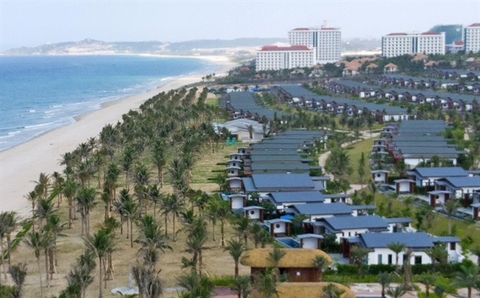 |
|
Bai Dai Beach in Cam Ranh City is being developed into a high-class tourist and resort area in the southern province of Khanh Hoa. Coastal destinations started to recover in May with growing bookings.
|
October saw the highest occupancy levels in Ha Noi and HCM City since the second quarter of the year.
In Ha Noi, average occupancies over the past two months were up almost 35 per cent as local corporate business gradually resumed, and long-term stay demand increased. The average also includes properties used as quarantine facilities.
Meanwhile, “coastal destinations started to recover in May with improving traction and growing bookings, however the second wave of COVID-19 in Da Nang badly affected the high season," said Mauro Gasparotti, Director of Savills Hotels Asia Pacific.
"City hotels have had healthy rises of MICE (Meetings, Incentives, Conferences and Exhibitions) business over the past few months, providing additional revenue to the properties. The ability to capture more budget-oriented travellers has seen some hotels offering lower-than-normal rates."
"However, recently promoted citywide Staycation packages have only benefited a few properties. We have seen bookings increase over the last 3 months, but Da Nang is still struggling to get above 20 per cent average occupancy.”
Nha Trang and Phu Quoc have seen higher occupancies, especially over weekends when some resorts run at low vacancies with travellers taking advantage of promotions.
Recent world developments around COVID vaccines allow light at the end of the tunnel. The country's containment of the pandemic has reaffirmed investor appeal and no doubt reassured potential travelers of just how safe Viet Nam is. One of the few countries with positive growth is set to lead recovery in Asia Pacific. The national tourism industry is already seeing appeal overseas, according to Savills.
"Still, the overall resort market is struggling to cross the 25 per cent occupancy, apart from resorts located in drive-to destinations being 10 to 15 percentage points over the country average,” Gasparotti said.
“The market is in a slow recovery. Local demand, even if delivering a strong rebound, has not proven steady enough to support hotel and resort performance."
"Weekends have been acceptable, but weekday demand is low. Most hotels, by cutting costs, have tried to find lower operational breakeven points, and only a few will be able to see a decent result for 2020," he said.
"Expectations for 2021 are positive but mainly focused on the third and fourth quarter when travel restrictions are anticipated to be eased, with corporate guests and independent travellers from neighbouring countries able to return and partially support the hotel and resort market."
Regarding the recent local community transmission in HCM City, Mauro added: “We have seen an impact on hotel booking cancellations in HCM City and the south, however, the larger impact is on the MICE business, where several conferences have been put on hold or delayed due to concerns."
"Any small outbreak will cause fear to spread, however, as with previous outbreaks, the government is quickly containing the problem and hopefully the fear will be over soon. The speed with which this was dealt helped minimise economic damage while underlining how safe Viet Nam is as a destination. We remain positive about the future of the industry, and especially in Viet Nam,” he said.
The pandemic has made the first 11 months of 2020 challenging for Asia Pacific region hotels with the vast majority reporting poor performance or many forced into temporary closure. Occupancies and average daily rates (ADR) slumped with average room revenues down by half, according to Savills. — VNS

Foreign inflows for Vietnam’s real estate bouncing back
The first major signs of a resumption of investment activity have emerged in the real estate market with new brand names entering and others expanding their portfolios in Vietnam.

Industrial property continues dominating Vietnam’s 2020 real estate sector
Industrial property continues dominating the market thanks to the fast growing manufacturing industry.